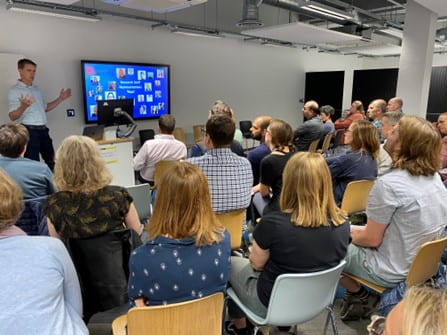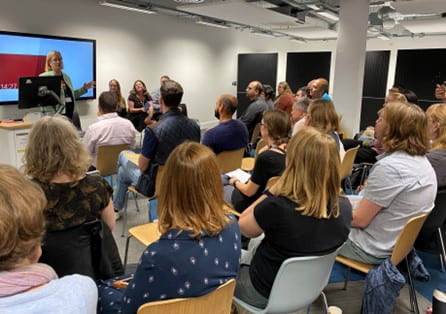On 14 September, Concordat Champions and Research Staff Reps gathered in Beacon House with the University of Bristol Vice-Chancellor, Professor Evelyn Welch, to delve into the challenges that research staff currently face and explore solutions for constructive changes towards a better Research Career Pathway. This is underpinned by the university’s commitment to implementing the principles of the Concordat to support the career development of researchers, which is an agreement between UK funders and employers of research staff.
The event began with presentations by the Concordat Champion and Research Staff Reps committee chairs, to shed light on the current state of affairs for research staff in academia. Areas in which Bristol can have (and already is having) an impact and leading role nationally were highlighted, including the recent move from fixed-term to open-ended contracts for research staff. However, a survey of principal investigators has revealed significant negative impacts faced in terms of recruitment and retention of research staff due to uncompetitive salaries, job precarity, and the high cost of living in Bristol, resulting in a loss of talent to more lucrative positions in industry or academic institutions abroad. In particular, this is having a disproportionately high impact on staff relocating to Bristol from overseas due to very high visa and immigration surcharge costs. In this regard, Bristol’s reimbursement policy is out of step with other UK institutions.

After a brief interlude for coffee and cookies, Evelyn took to the stage, describing her own experiences of life as an early career researcher and lecturer and the accompanying job insecurity, and her past experiences implementing the concordat in UK research institutions. She shared a genuine desire to listen to the concerns of research staff and to be of service to the research community.

The VCs opening remarks were followed by an open forum, with researchers posing questions including plans to improve university policy on costs incurred by staff from overseas, alternatives to funding-limited contracts and associated redeployment, improving access to the university nursery for short-term research staff, and giving the concordat action plan “teeth” to improve the career progression and prospects of all researchers and staff in research adjacent roles.
The VC’s responses and commitment to addressing these concerns were met with optimism towards positive change. She underlined the remarkable talent and dedication of the university’s research staff, acknowledging their vital contribution to the university’s success. In her own words:
“Positive change comes from listening to your concerns… we get it right when we listen.”
As we move forward, plans are underway for regularly VC gatherings, to continue towards a better research pathway and a more inclusive research culture.
More information on the Research Staff Reps Committee, Concordat Governance Group, and the Research Staff Working Party and associated contacts can be found at the Bristol Clear Staff Development Webpages.
